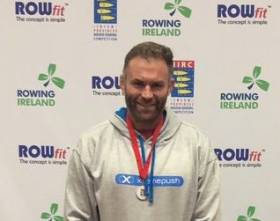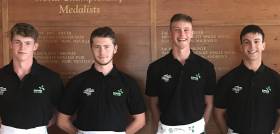Displaying items by tag: Alex Byrne
Byrne Sets Junior Record at Provinces Indoor Rowing
#Rowing: Ocean rower Damian Browne and junior rowers Alex Byrne and Caoimhe O’Sullivan were amongst the record breakers at the Provinces Indoor Rowing Championships in the University of Limerick on Saturday.
Shandon rower Byrne hit six minutes and five seconds for the 2,000 metres category, while O’Sullivan of Muckross covered 1,000 metres in three minutes 44.6 seconds.
Browne, a former professional rugby player who completed his row across the Atlantic earlier this year, took and beat the old record for 500 metres. He set a new time of one minute 16 seconds.
Records set at the Provinces Indoor Rowing Championships, University of Limerick, Saturday:
Men – Open 500m: Damian Browne 1 min 16 sec. Lightweight, Open 500m: Aidan Greene, Kincasslagh RC 1:28.7. Jun 18, 2,000m: Alex Byrne, Shandon RC 1:28.7.
Women – Lightweight Open 500m: Niamh Doogan, Kincasslagh RC 1:45.1. Jun 16 1,000m: Caoimhe O’Sullivan, Muckross.
Ireland Denied as Denmark Set New World Junior Championships Record
#Rowing: Ireland just missed out on a place in the A/B semi-finals of the junior men’s quadruple at the World Junior Championships in Racice, Czech Republic. The crew of Luke Hayes Nally, Alex Byrne, Jack Dorney and Jack Keating finished third to Denmark and Chile, with just two boats going on; the race was fast, setting a new record for this event at a World Junior Championships.
Chile had led through most of the race, with Denmark never far away. Ireland moved into a clear third place. In the final 300 metres Denmark charged into the lead and flew away from Chile. Ireland did their best to catch Chile, but the South Americans kept their nerve well and held on to the crucial second spot by a length.
Ireland go to the C/D Semi-Finals. Earlier the women's junior pair of Eliza O'Reilly and Gill McGirr had qualified for the A/B Semi-Finals.
World Junior Rowing Championships, Racice, Czech Republic (Selected Results)
Men
Quadruple – Repechage Two (First Two to A/B Semi-Finals; rest to C/D Semi-Finals): 1 Denmark 5:52.45, 2 Chile 5:56.25; 3 Ireland (L Hayes Nally, A Byrne, J Dorney, J Keating) 5:58.73.
Women
Pair – Repechage (First Three to A/B Semi-Final; rest to C Final): 1 France 7:25.97, 2 Hungary 7:29.32, 3 Ireland (E O’Reilly, G McGirr) 7:31.49.

























































